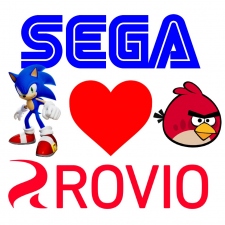With the news of Rovio’s acquisition by gaming giant Sega for a whopping €706m ($776m) officially confirmed and in progress all that seems to be left is to ask… how did we get here?
To begin with, a quick primer on Rovio. Widely regarded as one of the most important mobile studios of all time, Rovio’s flagship Angry Birds franchise has made them not only hugely successful with over five billion app downloads and counting, but has also led to them being considered one of the main driving forces behind Finland - their homeland - becoming the spiritual home of mobile gaming.
Sega meanwhile needs no introduction, having been one of the major contenders in the console arms race. Although Sega’s days of hardware manufacturing and competition are behind them they still boast many highly marketable franchises (including Sonic The Hedgehog) as well as best-selling games and subsidiary studios.
Why are Rovio selling?
So why would a company like Rovio look to sell up anyway? Well one reason may be that despite the success of Angry Birds, it's a success they've been unable to repeat. Diversification has been key for many game companies to stay ahead of the game, while Rovio has leant almost entirely on their irate avians. Maybe it's fear of flying solo or the sheer burden of keeping the porfolio of Birds games happy in their coop but Rovio have been cautious to the point of being sedentary in recent years.
It's a scenario that has led to Rovio clearly being an attractive money maker but one whose potential to repeat the trick and roll in the big bucks may - rightly or wrongly - be percieved as being beyond them. And yet the talent and tech of the company remain unreproachable. A situation that, teamed with management happy to rest on laurels and take a breather, made them prime accquistion bait.
And what better way for an enterprising company with money to burn (and keen to show off their new mobile focus) than to snap up one of the big, original, successful, tightly run and highly regarded mobile games companies? Who also owns Angry Birds too…
The Playtika paradox
The first to bite at the Rovio cherry (at least publically, anyway) was Israeli-based developer and publisher Playtika. They made two offers to Rovio publicly, for around $737.5m, a figure about $30m shy of what Sega ended up paying. However, the deal would ultimately not get past initial discussions, with Rovio actively courting new buyers rather than engage into a potentially turbulent deal with 'troubled' Playtika.
For Playtika the deal would have represented a high profile step forwards and a break from the restructuring and reorganising that had seen a halt to the development of new titles and layoffs in multiple areas of their business. It seems that the sticking point with Playtika wasn't the money…
While having worked with Sega previously and sharing a love of plush toys and movie spin-offs, Sega must have seemed a far more natural fit than a strictly business operation such as Playtika.
Other interested parties
While it’s not known what was going on behind the scenes, Sega’s acquisition raises a number of interesting questions. Chiefly who else was in the running to acquire Rovio? Well, probably NOT other gaming giants like Nintendo or Microsoft.
While Nintendo have rather solidly stayed out of mobile gaming aside from its utility as a promotional tool for their mainline console games, Sega has had a continued presence in the space, however small. Other major players such as Microsoft are embroiled in their own ongoing legal sagas while others such as Ubisoft are currently trying to reorganise and restructure specifically to make them more palatable to buyers themselves.
Sega in mobile & something for Rovio too
Sega already has an established presence in mobile both through their subsidiaries and through titles based around their own characters such as Sonic Dash. However, Rovio represents a massive leg-up in that department. Angry Birds is arguably one of the most iconic mobile gaming franchises of all time, with massive hits and two Hollywood films to their name. Now Sega get to snap up a fully-formed catalogue of mobile hits.
Plus Sega's comments on Rovio's tech speak for themselves: “Sega strongly believes Rovio’s platform, Beacon, holds 20 years of high-level expertise in live service-mobile game operation centered around the United States and Europe.” Sounds like someone just got a kick-start in major mobile operations.
But what’s the benefit to Rovio? It's to be hoped that under Sega's wing they may finally have the energy and backing to hatch something new and take a risk. A purchase for Rovio represents a huge shot in the arm. A whole new partner and direction for the company to follow. Although we’re not likely to see them make their own Sonic mobile game anytime soon, Sega offers familiar stability and more than likely an overall, unified plan for the future.
What's next?
It's worth stressing that while the deal is 'done' in actuality there's still plenty of water to pass under the bridge and potentially cause the deal problems. Here are the important milestones still to hurdle. But with management on both sides saying all the right things you can bet they're working hard to ensure smooth sailing.
So will Sega acquiring Rovio represent a watershed moment? Some sort of new move towards major companies acquiring formerly independent developers? Possibly. 2023 is looking to be a bit rougher than the halcyon days of growth during Covid, so many companies may be looking for a safe-harbour round about now. And with Rovio’s high price-tag there's bound to be some hoping for a similar windfall.






















